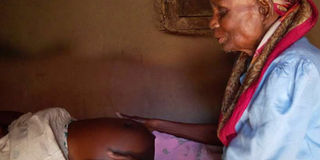MATERNAL HEALTH: Women still prefer to deliver at home rather than hospitals

Birth attendants top choice for pregnant mums in rural Kisumu. PHOTO| FILE| NATION MEDIA GROUP
What you need to know:
- Eighty-nine-year-old Helena, a famed traditional birth attendant (TBA) with over 30 years’ experience, records the names of the parents, the babies and other personal details.
- Some of her clients are women who delivered their first babies in hospital, but vowed never to return due to the “unpleasant” treatment from the nurses.
- A 2016 survey of 100 unskilled birth attendants in western Kenya found that they still use inappropriate or outdated practices to deal with obstetric complications.
- The current nurse to patient ratio of 83 nurses for every 10,000 patients falls short of the WHO recommendation of 25 nurses for every 10,000 patients, according to numbers from the Kenya Health Worker Report.
Hellen Anyango Singu or Helena Nyakasagam, as she is popularly known, is a revered woman in Kokumu Village in Kisumu County.
When we get to her home, she meets us at the gate, looks at the greenery surrounding her homestead and sighs pre-emptively: “Some herbs are as old as you are,” she says of some of the tools of her trade as she lays her right hand on my shoulder and ushers us to a bench where pregnant women wait patiently for their turn to see her.
An old grass-thatched, mud-walled, one-roomed house stands out in the homestead – an improvised maternity ward with four metal beds, a stool, a weighing machine, water cans, a pair of scissors and a pile of notebooks that hold the secrets of the babies who enter the world in this room, and their mothers.
Eighty-nine-year-old Helena, a famed traditional birth attendant (TBA) with over 30 years’ experience, records the names of the parents, the babies and other details such as age, sex, weight and date and time of birth.
RESPITE FROM “CRUEL NURSES”
She learnt the art from her grandmother, a well-known herbalist who taught her the trade. And with modernity, she says she was trained in midwifery in various hospitals in Kisumu
County, to boost her skills, because though the focus is on women to deliver in hospitals with safe and improved medical care, many women still choose to go to the trusty Helena.
Some of her clients are women who delivered their first babies in hospital, but vowed never to return due to the “unpleasant” treatment from the nurses.
“Some nurses are so cruel. They insult you and treat you with so much disrespect,” says Emily Achieng, a 26-year-old mother of one, who is expecting her second baby, and waiting for her turn to see Helena.
“In contrast, Helena handles us with utmost gentleness that puts us at ease,” she says gesturing towards the “maternity ward.”
SKILL AND KNOWLEDGE GAP
As women like Emily continue to throng the homes of traditional birth attendants, health officials worry that they, especially first-time mothers, are at risk of death because the birth attendants are deemed to lack the critical knowledge, skills and equipment to handle complications that may arise before, during and after childbirth.
Complications such as post-partum haemorrhage, infections and hypertension or obstructed labour would leave even the most well-intentioned traditional birth attendant at a loss.
A 2016 survey of 100 unskilled birth attendants in western Kenya found that they still use inappropriate or outdated practices to deal with obstetric complications.
However, the TBAs often referred these women to health facilities. Helena, for instance, encourages her clients to carry their hospital cards, for easier referral to health facilities if complications arise. The other concern has been prevention of mother to child transmission of HIV.
“Without attending prevention of mother to child treatment programmes that are only offered in health facilities, pregnant women run the risk of infecting their newborns and even contracting the virus from the midwife herself or other expectant mothers,” says Dr Elizabeth Ogaja, the Kisumu County Executive for Health.
However, seeing as TBAs are here to stay, the government hopes that giving them accreditation will help create a referral system so that the birth attendants can refer pregnant women to hospitals where trained experts can take over, especially in emergency cases.
There have also been efforts to train traditional birth attendants through community midwifery programmes, but this has largely been hampered by lack of funding.
CONVENIENT AND AFFORDABLE
At the home of Jessica Atieno Omuok, another birth attendant in Kasule village, Kisumu County, a large group of pregnant women wait expectantly to be attended to by Mama
Winnie, the popular reference to Mrs Omuok.
“When labour ‘knocks,’ women who cannot afford transport costs to hospitals get assistance here. They call me, and I rush to their homes immediately,” she says. Others seek her services because they don’t want to be attended to by male doctors and nurses at health facilities.
While county records show that attendance of ante-natal care is relatively high (71 per cent), at least 54 per cent of the same women prefer to give birth at home, usually assisted by traditional birth attendants.
The World Health Organisation promotes the training of TBAs to bridge the shortage of midwives and nurses in health facilities, as well as to boost safe motherhood, family planning and mother and child health and survival.
The current nurse to patient ratio of 83 nurses for every 10,000 patients falls short of the WHO recommendation of 25 nurses for every 10,000 patients, according to numbers from the Kenya Health Worker Report, that also shows that there are only 51,649 registered nurses aged 60 and below.
Therefore, the recommendation is that traditional birth attendants be trained, supervised and supported, until more qualified medical personnel are employed to achieve sustainable development goals, including reduction of maternal and infant deaths.
Hellen Anyango Singu, a traditional birth attendant, checks a pregnant woman at her improvised maternity unit at her homestead in Kisumu.


